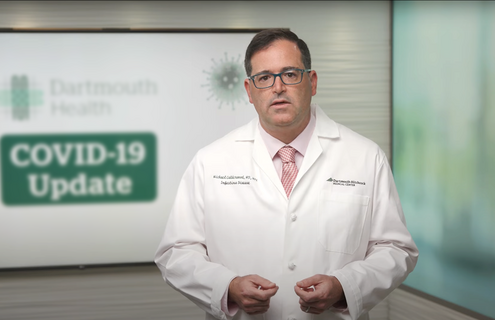
We asked you for your questions about COVID-19 and the COVID-19 vaccines, and Michael S. Calderwood, MD, MPH, Chief Quality Officer at Dartmouth Hitchcock Medical Center, recorded these answers.
The dynamics of the COVID-19 pandemic are constantly shifting. We continue to monitor community health information, workforce availability, and patient influx to make data-driven decisions and recommendations, such as reintroducing mask mandates in areas experiencing increased activity. To stay informed, follow Dartmouth Hitchcock Medical Center's communications for the latest news on COVID-19 safety measures.
Do I need to wear a mask?
Dartmouth Health is keeping a close eye on community health data and how many people in our workforce might be sick with COVID-19 or other respiratory viruses. We've already brought back masks in certain areas where there's been more activity, affecting both patients and our team. When you visit, please check the signs and wear a mask if they ask you to. Depending on data and science, this might change as the season goes on. We'll keep you updated on how things are going. The goal is to protect everyone receiving and providing care. Your cooperation helps keep the environment safe. To stay informed, follow our communications for the latest news on COVID-19 safety measures.
Will this vaccine work on the latest strains of COVID-19?
The vaccine we're using this winter has been well studied and targets over 90 percent of the viruses currently circulating in the community. It even shows boosted immunity against some emerging virus mutations you may be concerned about. The vaccines are designed to tackle both present and upcoming strains, offering a high level of protection. It's always best to check with your doctor to ensure the course of action for you.
If I recently had COVID-19, do I need to get vaccinated?
If you've recently had COVID-19, you already have some protection, and it's recommended that you wait for three months after recovering from the illness before getting vaccinated. This way, the vaccine will provide extended protection through the spring, guarding against any potential subsequent illnesses.
Should kids get the COVID-19 vaccine?
For kids aged five and older, getting a single COVID-19 vaccine for the 2023-2024 season is recommended to protect against the current viruses in the community. Even if you've been vaccinated before, you might not be fully protected against these new viruses. Children aged six months to four years may need only one vaccine, but if they haven't been vaccinated before, they might need more than one shot. It's best to check with your pediatrician to ensure the best protection as we enter the season.
How do I find COVID, RSV and flu shots?
As of October 2023, new COVID-19 vaccines are ready, and you may be wondering where to get them in the 2023-2024 season. You can find COVID-19, flu, and RSV shots by visiting vaccines.gov and using their search feature. These vaccines are in high demand, and supply is continuing to be delivered every week. We will be making it available across Dartmouth Health at many of our clinics and looking at some larger public health clinics. Stay tuned for more information on specific locations. For now, vaccines.gov has the latest updates on availability. Get vaccinated to protect yourself and others!
Why is the new COVID shot not a booster?
The 2023-2024 COVID-19 vaccine is no longer called a booster because we're adopting a new approach. Instead of considering it a booster, we now see it as an annual vaccine. This means you get it in the fall before the typical peaks in cases from December through February. It is in line with our strategy for protecting against viruses like the flu. So, while we initially thought of COVID-19 vaccination as a primary series and then a series of boosters, we now see this as a once-annual vaccine.